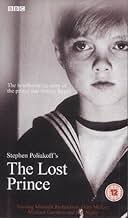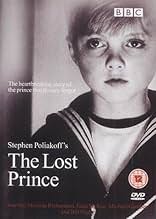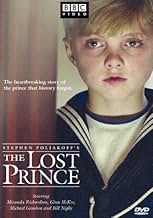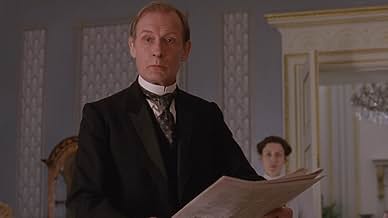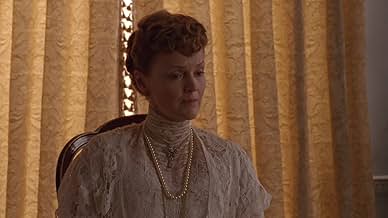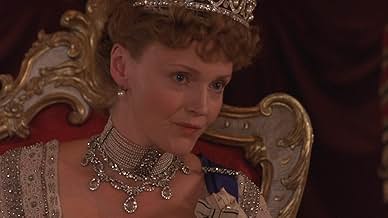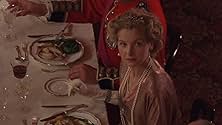VALUTAZIONE IMDb
7,6/10
2200
LA TUA VALUTAZIONE
Aggiungi una trama nella tua linguaThe story of Prince John, the autistic and epileptic youngest son of Queen Mary and King George V, who spent his whole life hidden away from public view and died at the age of 13 in 1919.The story of Prince John, the autistic and epileptic youngest son of Queen Mary and King George V, who spent his whole life hidden away from public view and died at the age of 13 in 1919.The story of Prince John, the autistic and epileptic youngest son of Queen Mary and King George V, who spent his whole life hidden away from public view and died at the age of 13 in 1919.
- Vincitore di 3 Primetime Emmy
- 8 vittorie e 21 candidature totali
Sfoglia gli episodi
Recensioni in evidenza
This lavish production, uses the vehicle of the short life "The Lost (from history) Prince" to portray what Royal Life was like at the turn of century. The sumptuous production illustrates the splendour, luxury, misery and ultimately the futility of the Royals. There are wonderful images of the beautiful daughters of the tsar. Epileptic Prince John is however seen as the only one as being allowed to be himself. Wonderful performances of the roles of the ice queen Queen Mary, Lalla the nursemaid, Prince John young and old.Has been criticised for being too long, but you must try and get to see this when it comes to your country.
Historical facts, Prince John died aged 14 isolated from his family in a farmhouse at Sandringham? cared for by Lalla Bill. Only one historical reference to him still existed. The height of George V is still a secret.
Historical facts, Prince John died aged 14 isolated from his family in a farmhouse at Sandringham? cared for by Lalla Bill. Only one historical reference to him still existed. The height of George V is still a secret.
I was very much moved by this movie about the youngest child of King George V (1911-1936) and Queen Mary. The young Prince John was largely kept out of the public eye because he was thought to be an embarrassment to the Royal Family.
The Prince was diagnosed with epilepsy by his doctors and because of this and his learning disabilities, he was dismissed by both doctors and teachers as a child with little potential and a liability to the Royal Family. In fact, the young Prince was capable of learning as his governess, played by Gina McKee, was able to prove. It is quite likely that he had autism, a condition that makes social interaction difficult but is not a sign of low intelligence. In fact, with proper guidance and some understanding, he was shown to have exceptional talent, not unusual with autism.
The Prince was used to spending much of his time at Sandringham, the royal estate in Norfolk and home of his grandmother Queen Alexandra, which was where he enjoyed his own private garden. He also had a strong friendship with his slightly older brother Prince George, later the Duke of Kent. This is interesting because George was something of a pariah himself as a young man but later became an important working royal with his wife Marina and their children by his side.
What I found most unsettling was the distance between John and his parents George V and Queen Mary. The King and Queen performed their official roles very well but ran a tight ship, which put a lot of pressure on their children. Whether true to life or not, King George is shown as a high strung monarch, who was incapable of acting naturally with his youngest son, to the point of unleashing outbursts of anger towards John. John's grandfather Edward VII showed far more understanding of John but he died when John was only five. One can imagine that life with the grandparents - Edward VII and Queen Alexandra - would have allowed John an easier childhood.
Queen Mary, a tower of strength to the the Royal Family for almost 60 years, seemed incapable of showing any personal affection. When tears welled up in her eyes, you could see her sorrow but she was incapable of hugging him or speaking to him as a loving mother. Queen Mary felt constrained by her role. She showed anger towards the governess whenever John without warning, appeared in front of the public or government officials. In fact, as governess, it was Gina McKee who showed great understanding and took great pride in young John's progress.
The movie seems to have a layer of truth as the story of a special needs child, who is subjected to pressures and misunderstandings as a member of the Royal Family. This is the flip side of the life of privilege. The one bright light in his short life was his governess who was able to draw out his overlooked talents and impart to him some measure of happiness despite his imposed seclusion.
The Prince was diagnosed with epilepsy by his doctors and because of this and his learning disabilities, he was dismissed by both doctors and teachers as a child with little potential and a liability to the Royal Family. In fact, the young Prince was capable of learning as his governess, played by Gina McKee, was able to prove. It is quite likely that he had autism, a condition that makes social interaction difficult but is not a sign of low intelligence. In fact, with proper guidance and some understanding, he was shown to have exceptional talent, not unusual with autism.
The Prince was used to spending much of his time at Sandringham, the royal estate in Norfolk and home of his grandmother Queen Alexandra, which was where he enjoyed his own private garden. He also had a strong friendship with his slightly older brother Prince George, later the Duke of Kent. This is interesting because George was something of a pariah himself as a young man but later became an important working royal with his wife Marina and their children by his side.
What I found most unsettling was the distance between John and his parents George V and Queen Mary. The King and Queen performed their official roles very well but ran a tight ship, which put a lot of pressure on their children. Whether true to life or not, King George is shown as a high strung monarch, who was incapable of acting naturally with his youngest son, to the point of unleashing outbursts of anger towards John. John's grandfather Edward VII showed far more understanding of John but he died when John was only five. One can imagine that life with the grandparents - Edward VII and Queen Alexandra - would have allowed John an easier childhood.
Queen Mary, a tower of strength to the the Royal Family for almost 60 years, seemed incapable of showing any personal affection. When tears welled up in her eyes, you could see her sorrow but she was incapable of hugging him or speaking to him as a loving mother. Queen Mary felt constrained by her role. She showed anger towards the governess whenever John without warning, appeared in front of the public or government officials. In fact, as governess, it was Gina McKee who showed great understanding and took great pride in young John's progress.
The movie seems to have a layer of truth as the story of a special needs child, who is subjected to pressures and misunderstandings as a member of the Royal Family. This is the flip side of the life of privilege. The one bright light in his short life was his governess who was able to draw out his overlooked talents and impart to him some measure of happiness despite his imposed seclusion.
10kos5
The Lost Prince is one of those wonderful pieces that you rarely see. Beautiful, touching, moving, and heartbreaking are only a few words to describe it. It was informative also because I had never before known of the epileptic Prince John. I fell in love with Johnny the first time I saw him.
The acting was fantastic. I loved Lalla. Gina Mckee did an excellent job in portraying her. Miranda Richardson(Queen Mary) also did a wonderful bit of acting as the seemingly heartless Queen. I was reduced to tears at the end.
If you've never heard of the wonderful little Prince, or you'd just like to watch a different perspective on the Royal family, see the The Lost Prince, you'll be glad you did.
The acting was fantastic. I loved Lalla. Gina Mckee did an excellent job in portraying her. Miranda Richardson(Queen Mary) also did a wonderful bit of acting as the seemingly heartless Queen. I was reduced to tears at the end.
If you've never heard of the wonderful little Prince, or you'd just like to watch a different perspective on the Royal family, see the The Lost Prince, you'll be glad you did.
10Alex-372
The Lost Prince is a beautiful costume drama from Stephen Poliakoff, about the young brother of prince George, who nobody wanted to talk about and who was most likely autistic and most definitely epileptic, diseases respectively unknown and misunderstood at the time.
This story is roughly told through his eyes, and describes in beautiful detail the transition of Europe from a continent ruled by related monarchs (many of them Saxe-Coburg and Gotha), until the end of this system during and after WWI. As important historical events manage to find their way into palace life (the suffragette movement, the rise of ordinary people as politicians, the telephone and the motor car), they more often seem like foreign intrusions into the world of the palace.
As this is seen through the eyes of the little boy, there is very little value judgement as to whether this system was a right or just one, and at the end you are struck with the horror of the murder of the tsarist family and their beautiful daughters, but we never see the reign of terror they themselves and their secret police visited upon Russia.
There is a very funny incident when the tsarina during a visit to what she sees as her poor cousins estates, refuses to walk any further, because she has the "wrong shoes" for walking in the grass. Later, she remarks how "close" the houses of "other people" are and you can't help conclude she was simply afraid of being killed by the proletariat. :-)
Very well acted by Miranda Richardson (Blackadder), Michael Gambon, Tom Hollander, Gina McKee as the governess Lalla but especially by the two child actors who play Johnny. They look like great kids rather than brats.
Highly recommended if you can catch this on the BBC or HBO.
This story is roughly told through his eyes, and describes in beautiful detail the transition of Europe from a continent ruled by related monarchs (many of them Saxe-Coburg and Gotha), until the end of this system during and after WWI. As important historical events manage to find their way into palace life (the suffragette movement, the rise of ordinary people as politicians, the telephone and the motor car), they more often seem like foreign intrusions into the world of the palace.
As this is seen through the eyes of the little boy, there is very little value judgement as to whether this system was a right or just one, and at the end you are struck with the horror of the murder of the tsarist family and their beautiful daughters, but we never see the reign of terror they themselves and their secret police visited upon Russia.
There is a very funny incident when the tsarina during a visit to what she sees as her poor cousins estates, refuses to walk any further, because she has the "wrong shoes" for walking in the grass. Later, she remarks how "close" the houses of "other people" are and you can't help conclude she was simply afraid of being killed by the proletariat. :-)
Very well acted by Miranda Richardson (Blackadder), Michael Gambon, Tom Hollander, Gina McKee as the governess Lalla but especially by the two child actors who play Johnny. They look like great kids rather than brats.
Highly recommended if you can catch this on the BBC or HBO.
This is a truly wonderful production with brilliant, almost surreal touches that lift this drama about the crowd.
I would love to know if any of Prince John's drawings survived. They had, or at least the ones used for the film had a Chagal-like quality that was both very graceful and artistic and filled with insite as to the inner character of the subjects. "The Tsar Swimming" and "Fat Mary" are two example. His father wearing a crown far too big for his head is a masterpiece.
I also wonder if Prince John wasn't a savant. His drawings were exceptional and far ahead of his time and his musical ability was,(if the film properly portrayed this talent)quite remarkable.
What is wonderful about this film is the sense that John despite everything managed to form his own little community on his "Estate", surrounded by people who really did love him. I also have the feeling that he was quite a happy child most of the time.
His parents were no worse than other Royal parents and a great deal better than most.
Special mention should be made of the marvelous Bibi Anderson who played Queen Alexandra so perfectly. At the funeral she even managed to look almost exactly like the Dowager Queen.
Someone mentioned that they didn't believe that the Tsar and the Tsarina would have acted as coldly toward their relations when visiting at Cowes. Unfortunately, that's just how they acted. They did believe that they were seated higher at the table of the Rulers of the World than their cousins in England who had to make-do with smaller versions of their own vast palaces in St. Petersburg. After all the Tsar was the last Absolute Monarch in the world. He even had to approve of every marriage and every divorce. No decision could be made unless he gave his approval. His cousin George had to actually deal with a rabble of advisors and that intrusive Parliment.
The scenes of the Tsar swimming were especially out of touch with reality, just as the Tsar was out of touch with the reality of his situation.
The Russian Grand Duchesses were so dream-like in their lovely summer laces and huge flower-like hats. All of John's imagined scenerios were touched with this combination of wistfullness and joy.
I mention these things because they haven't been mentioned before and they are what I will bring with me forever. Those haunting images of the children running on the beach, the flower-hats in the flower-garden and John peeking through the rails of the balcony at the beautiful lady at the banquet who smiles and waves back at him...a small and precious moment to be treasured.
See this film and fall in love with a child that refuses to be "Lost".
I would love to know if any of Prince John's drawings survived. They had, or at least the ones used for the film had a Chagal-like quality that was both very graceful and artistic and filled with insite as to the inner character of the subjects. "The Tsar Swimming" and "Fat Mary" are two example. His father wearing a crown far too big for his head is a masterpiece.
I also wonder if Prince John wasn't a savant. His drawings were exceptional and far ahead of his time and his musical ability was,(if the film properly portrayed this talent)quite remarkable.
What is wonderful about this film is the sense that John despite everything managed to form his own little community on his "Estate", surrounded by people who really did love him. I also have the feeling that he was quite a happy child most of the time.
His parents were no worse than other Royal parents and a great deal better than most.
Special mention should be made of the marvelous Bibi Anderson who played Queen Alexandra so perfectly. At the funeral she even managed to look almost exactly like the Dowager Queen.
Someone mentioned that they didn't believe that the Tsar and the Tsarina would have acted as coldly toward their relations when visiting at Cowes. Unfortunately, that's just how they acted. They did believe that they were seated higher at the table of the Rulers of the World than their cousins in England who had to make-do with smaller versions of their own vast palaces in St. Petersburg. After all the Tsar was the last Absolute Monarch in the world. He even had to approve of every marriage and every divorce. No decision could be made unless he gave his approval. His cousin George had to actually deal with a rabble of advisors and that intrusive Parliment.
The scenes of the Tsar swimming were especially out of touch with reality, just as the Tsar was out of touch with the reality of his situation.
The Russian Grand Duchesses were so dream-like in their lovely summer laces and huge flower-like hats. All of John's imagined scenerios were touched with this combination of wistfullness and joy.
I mention these things because they haven't been mentioned before and they are what I will bring with me forever. Those haunting images of the children running on the beach, the flower-hats in the flower-garden and John peeking through the rails of the balcony at the beautiful lady at the banquet who smiles and waves back at him...a small and precious moment to be treasured.
See this film and fall in love with a child that refuses to be "Lost".
Lo sapevi?
- QuizKing George V had six children, two of whom used the name George. His second son was Prince Albert Frederick Arthur George, known to the family as Bertie, who became King George VI. He had a bad stutter that began in early childhood and lasted into adulthood. His third son, Johnnie's closest sibling in this movie, was Prince George, Duke of Kent. He grew up to live a life that was considered scandalous, and died in a plane crash in 1942.
- BlooperWhen the Romanovs are in England, Alexandra speaks English with a Russian accent. In real life, Alexandra was a German princess raised in England by her grandmother, Queen Victoria. She spoke English with a British accent.
- Citazioni
Prince George: [Speaking about Prince John] He was the only one of us who was able to be himself.
- ConnessioniFeatured in Masterpiece: The Lost Prince: Part 1 (2004)
- Colonne sonoreRondo for Glass Armonica
(uncredited)
Composed by Joseph Schmittbauer (as J.A. Schmittbauer)
(Queen Alexandra's birthday cake)
I più visti
Accedi per valutare e creare un elenco di titoli salvati per ottenere consigli personalizzati
Dettagli
- Data di uscita
- Paesi di origine
- Siti ufficiali
- Lingua
- Celebre anche come
- 失落的王子
- Luoghi delle riprese
- Black Park Country Park, Black Park Road, Wexham, Buckinghamshire, Inghilterra, Regno Unito(Russian lake, royal car)
- Aziende produttrici
- Vedi altri crediti dell’azienda su IMDbPro
Contribuisci a questa pagina
Suggerisci una modifica o aggiungi i contenuti mancanti

